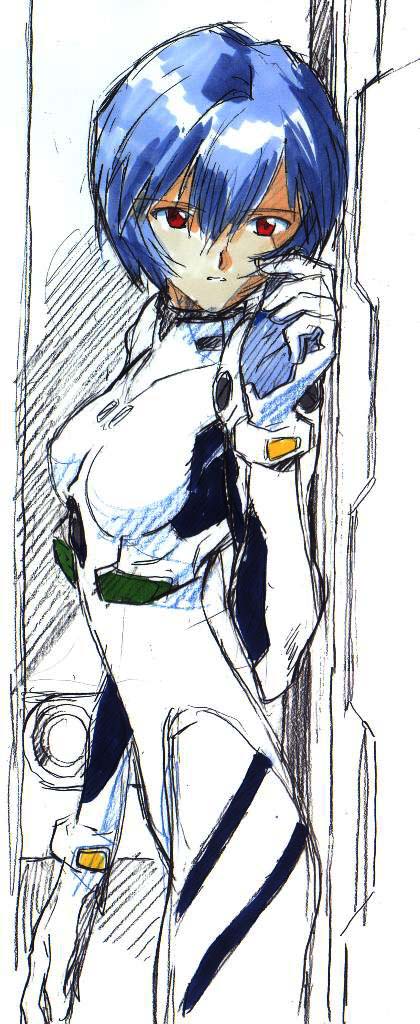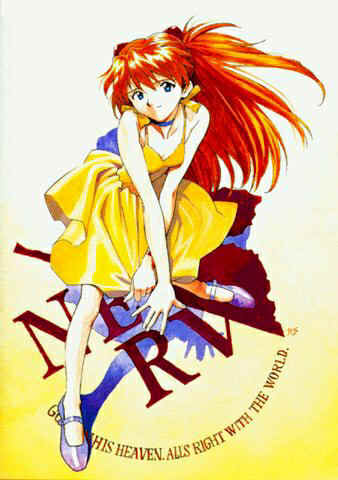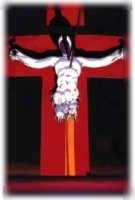
| -----In 1996, a piece of animation challenged the limits of animation, and broke the boundaries of what animation could accomplish. Neon Genesis Evangelion is not without its flaws, but to this day, it remains one of the most popular and controversial animes ever created. Meanwhile, Americans retain the silly notion that cartoons are only for children. I pose a question to Americans. Why are cartoons only for children? What universal rule makes it so. There is no universal rule. American cartoons are for children because Americans only make cartoons for children. Of course, this remains etched in our society, so when people see the controversial content of Evangelion, many are offended (yet none have a right to be). The truth is, you won't find anything in Evangelion that you haven't seen in many novels or live action films. Evangelion is special simply because it draws numerous controversial aspects together in a peice of animation. When Evangelion was released onto television in the late 20th century, even the people of Japan, who are used to seeing animation for teenagers and adults, were shocked at what they saw. Religious symbols, psychology, and philosophy. These three things are the basis of Evangelion and its many themes. It features characters who spend as much time questioning their existence and self-worth as they do fighting. In the end, it conveys a strong philosophical message; one that reflects the philosophy and feelings of its creator, Hideaki Anno. Neon Genesis Evangelion has become one of the most controversial, and one of the best, peices of animation because it was not afraid to break the rules (or society's norm). |

| -----In the beginning, Evangelion seems like your average peice of animation. It had an interesting plot to be sure, but it seemed like another show where people piloted giant robots in battles to defend the earth behind a common "war is hell" theme. With Evangelion, however, things turn out differently. The characters aren't romanticized. Instead, they are realistic, and have many emotional problems. By the final two episodes, the combat stops, and the show suddenly takes a dramatic turn into a philisophical analysis of the characters. As the show develops, we realize that there are strong questions being raised, and many different religious symbols are being used. Suddenly we hear of Adam, Eve, and Lilith. We see the Cross, the Jewish Tree of Life, the Seven eyes of God (A duplication of such is at the left {not the original from the anime}). Obviously, this is something different. When was the last time someone saw a American cartoon display such thought provoking questions, psychological complexity, or even such religious symbols. In America, it seems like the simple showing of a cross is punishable by death. Japan is different however. They don't set limits to their animation. Complex plots, realistic characters, and adult situations find themselves into Japanese Animation. Roger Ebert and his friends once commented on the Japanese Anime Grave of the Fireflies: "Its the most humane peice of animation I've ever seen." |
| -----So how does Evangelion challenge the limits of animation? First, it is important to realize that Evangelion was never meant to be considered a normal cartoon, or even a normal anime. Director Hideaki Anno created Evangelion to convey a message about his feelings and philosophy. In this way, Evangelion has the ability to communicate with the viewer; to make them understand the themes being discussed and the questions that are raised. In Prison of Self Consiousness, an essay written about Evangelion, the author states "The latter half of Evangelion TV series, especially the last two episodes, clearly had intention to break the closed domain of anime that keeps on offering narcissistic pleasure to otakus, that is, Evangelion had intention to crack the closed domain of anime, not from the outside, but from inside..." (Prison). Of course, perhaps the best example of how Evangelion is different from other animation is its characters. The characters of Evangelion are extremely realistic. True, they exist in a science fiction world where humanity battles strange creatures called the Angels with giant robots, but they are among the most realistic characters ever portrayed in a work of fiction. The characters aren't perfect, in fact, they often show signs of strong emotional conflict or mental trauma. The main character, Shinji Ikari, is a good example of this. Shinji is different because "where any other series would have designed Shinji to be a lecher, a girl-magnet, a smart-a$$, a genius, or otherwise unnatural, Eva created in Shinji the archetype of humanity and I respect that. Shinji was everyone. He felt despair, solitude, unhappiness, depression, and so many other things taht so few anime series bother to touch, let alone attempt to conquer. Shinji is an "every man," so to speak. Anyone cna relate to his problems." (Defense). This is the first major difference between Evangelion and everything else. Evangelion brought the viewer characters like Shinji; abandoned by his father, unsure of his life. A boy who was an extreme existentialist, believing that he is alone and always will be. Evangelion brought us Rei Ayanami, a shy and mysterious girl who believes that her life is worthless, that she cannot attain individuality in a society, and is incapable of expressing emotions. It gave us Asuka who, despite her energetic personality, turned out to be an insecure person, haunted by her mother's suicide, striving to become the best at what she does just to escape the torment of her life. People can relate to these characters because the problems they face exist int he real world. This is much different from the Mickey Mouse Cartoons and Bugs Bunny television shows. If the America realized that animation could attain this level of complexity and drama, then perhaps more animations of this level could be made. However, America seems to have animation rooted in comedy and fairy tales. Perhaps the real reason why American animation will never reach the complexity of Japanese anime is because companies like Disney believe that the goal of animation is to give animals human qualities, while Japan believes the goal is to create animation that is more human (more realistic). Evangelion is certainly a step in the right direction where character development is concerned. Never has any animation given its characters such psychological complexity. The realism of Evangelion's character is just one of many aspects of the show that seperate it from traditional animation. |

| -----Some American animation has attempted to break the limitations of traditional cartoons. Unfortunatly, none of them have succeeded. It seems that a shows with such complexity will never be succesful as long as the public still believes they are for children. The Simpsons is perhaps the only cartoon not intended for young children that has been succesful, and that is because it is comedy. Disney's first (and perhaps last) big step into a more complex show was Gargoyles, a show which featured Mythological background, a mini-saga storyline, and much better plotlines. Yet, the show lasted only 4 seasons. In Movies, we have seen things like Titan A.E. fail in the box office. Let us contrast this with Japan, where a single animated movie known as Princess Mononoke was too busy raking in box office reciepts to even acknowledge the existance of James Cameron's Titanic. |
| -----The fact that this series carries the name "Evangelion" should already make someone realize that this show is not like any other. Evangelion, the word, means Gospel in Greek. Gospel, or course, refers to the 'Good word' of religion. Neon Genesis Evangelion did not just break the limits of animation through the realism of its characters, but through its complex, often thought provoking plot. The story of Evangelion is very complex, and involves a number of religious symbols. At the risk of offending some, Evangelion has the Cross, the Jewish Tree of Life, the Angels, and many other aspects of western religion. Hikeaki Anno stated that these religious symbols were mere decorations, that is, they were meant to further the plot, not to pledge allegiance to one religion or another. Few anime series use religious symbols in such a way, and you will find very few examples of American animation using such symbolism. Hideaki Anno was not afraid of criticism, in fact, he didn't really care about it. Evangelion challenged the limits of animation with its controversial use of religious symbolism and emerged as one of the most unique animes ever created. |

| -----Throughout history, people have been criticised for portraying realistic problems or people in their works of fiction. Plays, movies, and even novels were often questioned at one point or another for their content. As time went on, people realized how deep these works of fiction were, and began to appreciate the use of such realism and drama. How true this is with Evangelion, which proves that the same level of drama, conspiracy, and philosophy can be raised in an animation. One person make an interesting point about why Evangelion's characters are so controversial to some: "We hate to recognize ourselves in Shinji because he is a "wimp," or "Wuss." He's a "Sissy." He's "pathetic." He "whines too much." Does he really? Or do we jsut claim he is a pitiful litle child because seeing ourselves reflected in someone like him is painful?" (Defense). This is an intersting question indeed. Perhaps Evangelion gained its status of controversy because people disliked the realism portrayed in its characters. Maybe not disliked, but people were certainly surprised by it. Since Evangelion, many other animes have taken a similar path, so Hideaki Anno's work can be viewed as a genre-breaker; an anime that would forever influence how people viewed animation. If only America could pick up on this trend. |

| -----The final aspect of Evangelion that sets it apart from many of its anime counterparts (and virtually all of American cartoons) is its use of philosophy and psychology. When a series can incorporate things too complex to understand when you first watch it, it obviously isn't for kids. The series deals with very complex and sometime controversial questions. The children in the series question why they live their lives the way they do, what their purpose of existing is. Some have questions about God, death, life and more. The final two episodes of the series are a prime example of this. Most who watch the final episodes cannot understand the psychology being discussed the first time they watch it. In truth, Evangelion requires a lot of analysis to be fully undestood. This sets it apart from any other peice of animation before its creation. It broke away from the common themes of other robot/sci-fi anime and showed a lot of psychological/philosophical complexity. If an American cartoon emerged with this level of thought provoking qualities, I would personally be amazed. Evangelion will always be known as the series that changed how people looked at animation, for it is not something that is childish (as America believes) but something that can be just as (and often more) thought provoking as any Oscar-winning movie. |
| -----It has been over 5 years since Evangelion was released. Since then, we have seen many more thought provoking anime series such as Serial Experiment LAIN. Unfortunatly, any American effort to do this on the Western side of the world has failed miserably. It is important to note that Japan has always viewed anime as a medium, not a genre. It is a medium where they can create any story, be it for adults, children, or for all ages. However, Evangelion was different because it didn't just have a complex plot, it featured characters that people could relate to, problems that exist in the modern world, religious symbols used in a controversial way, and philosophical complexity that was very rare before Evangelion was shown on television. Neon Genesis Evangelion is as influential as it is controversial. The show is not perfect by any means, but it accomplished what it set out to do: To challenge and break the established limits of animation. |
Quotes are taken from other essays written by fans of Evangelion. Their full work can be found here: